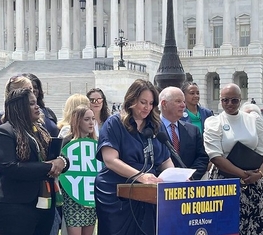Starting a Local League
The requirements and process for starting a new local League
On April 18, 2017, the LWVUS board approved a new membership engagement model and new local League recognition standards. It provides the beginning framework for:
- Simplifying and streamlining internal administrative practices for state and local Leagues;
- Focusing our organizational energy on programs that make an impact; and
- Leveraging new interest in the organization while letting go of processes that slow us down.
State Leagues are now free to serve as the administrative hub of new Leagues groups formed in their communities. This means state Leagues could, if they so choose, take on administrative functions, membership and record keeping, tax/IRS reporting, and other functions for new local League groups or existing Leagues who so choose. In turn, the new local groups would achieve recognition by LWVUS if they met basic criteria.
New local Leagues should focus on these three steps to start:
- Understand our nonpartisan policy and our DEI policy (guidance memo). Establish each for your League;
- Identify the leadership of the group and establish communication channels with the state; and
- Engage in our mission work – through state and national programs.
Criteria for LWVUS Recognition of New Local Leagues
- Leadership group, consisting of chairperson and at least 2 other members.
- Have a non-partisanship policy, have a DEI policy, subscribe to League positions (Impact on Issues), and respect other Leagues' jurisdictions/ use name of LWV.
- Partnership with state (or national) League to uphold business best practices to minimize risk and liability, such as IRS reporting.
State Leagues should decide whether to explore the new flexible model. If yes, look at what next steps are needed and how this fits with current structures in your state. If not, states should be prepared to provide guidance to new local Leagues on what logistical steps are needed for traditional recognition, such as bylaws and formal governance structure.
All Leagues need to apply for LWVUS Board of Directors recognition to officially be considered a League of Women Voters local League. The application can be found here and in the Guide to LWVUS Services for Leagues.
Local League Starter Kit
Use the link at the bottom to view and download a PDF that includes sample documents and resources to assist new Leagues.
These documents include sample:
- Memorandum of Understanding, including agreements on
- Per Member Payment and Collection MOU
- Database Entry
- IRS Reporting Status
- Money Flow
- Liability Coverage
If the local League will be administering itself, please refer to the below checklist with resources:
- Designate a member to act as roster manager and work with LWVUS staff to set them up with credentials in our roster portal.
- Apply for an Employer Identification Number (EIN): https://www.irs.gov/businesses/small-businesses-self-employed/apply-for-an-employer-identification-number-ein-online
- Apply for Tax Exempt status:
- Leagues should file as a 501c4 with an optional 501c3 if needed. Please review the different criteria and limitations and determine which is best for your Leagues.
- Open a bank account under the League’s name.
- Obtain liability coverage.
Any new local League should also:
- Follow state guidelines for formal recognition.
- Review LWVUS’ Services to Leagues: https://www.lwv.org/league-management/policies-guidelines/guide-lwvus-services-leagues
- Establish Bylaws. The first three Articles should match the name and intent of the LWVUS's and all Leagues should have a nonpartisan and DEI policy per the second Article. Sample bylaws can be found at https://www.lwv.org/league-management/leadership-development/sample-bylaws-template.
Logos are provided to new local Leagues after they are officially recognized by LWVUS: https://www.lwv.org/league-management/logos-brand-standards/state-local-league-logos.
Related Materials
Related Content
A checklist of the foundational governance items every League needs to do basic League business.
This template can be used by League's looking to create or update their bylaws.
The trainings cover how Boards can most effectively conduct their work and better understand their roles.




